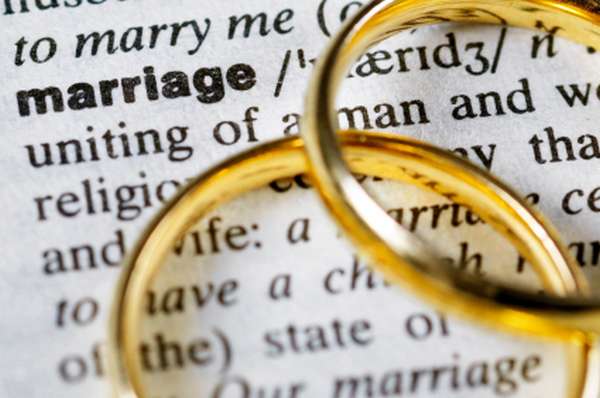Function Centre Pressured To Allow Same-Sex Weddings
 Media Release 12 April 2016
Media Release 12 April 2016
A function centre in the South Island which offers a venue for marriages has been pressured to change its policy as a result of a complaint to the Human Rights Commission. Living Springs in Lyttleton previously allowed only traditional wedding ceremonies but have now changed their policy.
“Faith-based function centers and camps are in a no-win situation. They can stick to their principles and suffer the consequences of court cases, substantial fines and legal costs, or they can capitulate and change their policies. Yet politicians promised that this pressure would not happen,” says Bob McCoskrie, National Director of Family First NZ.
When pushing through the gay marriage bill at breakneck speed, the Select Committee considering the bill said:
![]() It is our intention that the passage of this bill should not impact negatively upon people’s religious freedoms… The bill seeks to extend the legal right to marry to same-sex couples; it does not seek to interfere with people’s religious freedoms.’
It is our intention that the passage of this bill should not impact negatively upon people’s religious freedoms… The bill seeks to extend the legal right to marry to same-sex couples; it does not seek to interfere with people’s religious freedoms.’
But a legal opinion obtained by Family First NZ during the debate and made available to politicians and the select committee clearly explained that law ‘will interfere with people’s rights to act according to their beliefs and conscience’.” The politicians, by rejecting advice from Crown Law, considered it to be appropriate that churches, temples, mosques, synagogues and other faith-based organisations and service providers could not refuse to host and provide services for same-sex ‘marriages’, even if it went against their beliefs and conscience.
In the poll of 1,000 people undertaken by Curia Market Research during the debate in 2013, the poll found strong support for protecting those whose beliefs and conscience disagree with same-sex ‘marriage’, including 73% of respondents agreeing that churches, temples, mosques, and other places of faith such as a place like Living Springs should not be forced to allow same-sex marriages in their buildings.
“As we argued during the debate, the law will create a culture of coercion, despite the politicians promising otherwise. Unfortunately, this will not be the last case of this law interfering with people’s freedom of conscience rights and faith-based beliefs.”
UPDATE:
Why we stand by this Media Release, and why the critics have it all wrong
 The story regarding Living Springs was already in the media before we commented on it. All reports referred to the complaint to the Human Rights Commission and the subsequent action of Living Springs as a result of that complaint.
The story regarding Living Springs was already in the media before we commented on it. All reports referred to the complaint to the Human Rights Commission and the subsequent action of Living Springs as a result of that complaint.
Venue will allow same sex marriages after complaint
Stuff co.nz 31 March 2016: Earlier this month, a function centre in Lyttleton didn’t allow same sex couples to hire their venue to get married. But now after a complaint to the Human Rights Commission, they’ve changed their ways.
Couple at centre of Living Springs same-sex marriage complaint speak
Stuff.co.nz 5 April 2016: When she and fiancee Rebecca Northcutt inquired, though, they were turned away because the venue had a policy against hosting same-sex marriages. Following their inquiry, and subsequent complaint to the Human Rights Commission, Living Springs will now welcome gay couples.
… When friends of the couple who had legal backgrounds said they thought the policy didn’t sound lawful, they made the decision to make a complaint to the Human Rights Commission. Under the Human Rights Act, service providers can’t discriminate on the basis of sexual orientation. While Wiltshire and Northcutt were in the process of requesting mediation with Living Springs through the HRC, they read on Stuff that the venue’s policy had changed.
Chch venue pressured into allowing s/s weddings
Gaynz.com 13 April 2016
Family First Director Bob McCoskrie spoke by phone with the manager quoted in the article to seek further clarification.
It became quickly clear to us that while the manager didn’t feel pressured because of his own personal beliefs regarding the policy, the Management had not reached that same position. If they had, they would have changed the policy in 2013 when the law was changed, or when the first application for a same-sex wedding was made.
It is significant that Living Springs had had previous applications for same-sex weddings which they turned down – there were no complaints – there was no change of policy.
It was the ‘pressure’ of the Human Rights Commission complaint and the knowledge that Living Springs would not be protected by the law if they maintained their current policy that necessitated the urgent review of the policy. The absence of legal protection was acknowledged in our discussion with the manager.
Our media release therefore didn’t use the words ‘forced’ or ‘legally required’ or ‘bullied’. The claim that we were pushing a ‘bullying’ narrative is incorrect. We also didn’t say that the manager was pressured. It was the camp management who determined the policies of the camp that were pressured by the HRC complaint.
The media release highlighted the legal pressure that venues are now under – and we clearly stated:
“Faith-based function centers and camps are in a no-win situation. They can stick to their principles and suffer the consequences of court cases, substantial fines and legal costs, or they can capitulate and change their policies. Yet politicians promised that this pressure would not happen.”
The camp manager can say that he was not pressured – but it was not his decision alone to make. It was the decision of the Management.
To be clear, we disagree with their change of policy. Obviously.
But what our media release highlighted was that organisations are being and will be pressured to change their policies by the law as it stands – and by same-sex couples making complaints to the Human Rights Commission. It does not protect the consciences and beliefs of those who believe in traditional marriage.
Supporters of same-sex marriage know this.
That’s why they simply didn’t find another venue.






